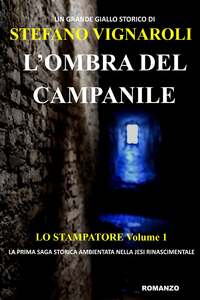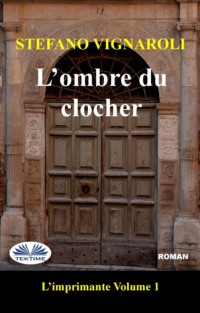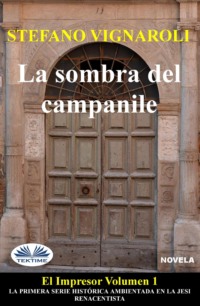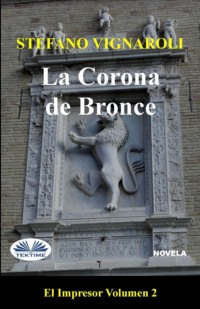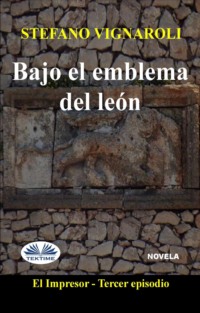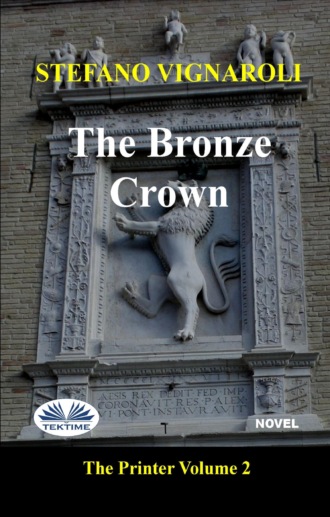
Полная версия
The Bronze Crown
She had tried to limit her movements as much as possible, but at a certain point Andrea had perceived her awakening, had just opened her eyelids slit open, had brought his lips closer to her face, had printed a kiss on one cheek and had untied her from the embrace with delicacy. At that point Lucia, though reluctantly, decided to get up. She reached the bathroom and let the lukewarm water from the shower run over her body for a long time, then, still in her bathrobe and with her hair wet, she gained the kitchen and prepared coffee for her and Andrea. She sat down at the table, with the steaming cup in front of her, greedily resuming the reading of the text she had left up there the previous evening. Attracted by the strong smell of the drink, Andrea soon appeared and pulled down his coffee from the pot and sat down in front of her, activating the tablet to read the morning news on the ANSA website.
«I don't understand why you don’t turn on the television instead of ruining your view on that small screen. There’s news on certain channels all the time and...»
«It’s not the same», Andrea interrupted her. «Some particular news on TV doesn’t pass it on. I’m following closely the events of the archaeological sites destroyed by the Jihadists, the Islamic extremists. The official news are making us believe that the situation is much more serious than it is in reality. But in any case, for me, the loss of finds thousands of years old remains a fact of extreme gravity. When some of these areas are freed, I think I might be ready to leave immediately to assess the damage and bring help to the historical reconstruction of the ancient cities. We saw last year with Nineveh that much of what the ISIS militants had shown as destroyed could be salvaged.»
«And would you leave me here alone for millennia-old ruins?» she turned to him, grabbing his hand and holding it in hers.
«If you wouldn’t follow me, yes. Work is work, and I find mine very exciting. Of course, not that I’d stop loving you, but I wouldn’t give up my commitments anyway.»
Pretending to be a little offended, Lucia took her hands out, looked for the pack of cigarettes and lit one.
«Without perhaps disdaining some exotic love affair, eh? Never trust men. They’re traitors by nature.»
Lucia drew long from the cigarette and puffed the smoke at him, who took it out of his hands and pulled it back.
«Oh, not me. I'm a faithful man!»
«That statement is all to be considered. You’re 30 years old and you make love like a “matter expert”. I know nothing about your previous life. Who knows how many women you had before me!»
As if not to get involved in a speech he didn’t want to face for any reason in the world, Andrea changed the subject.
«But let's come to your work, rather. What did you find so interesting in the humble library of this dwelling, that you’re up until two in the morning and find yourself here at seven in the morning already reading again?»
Waiting for an answer, Andrea crushed the cigarette half consumed in the ashtray. Lucia, unsatisfied with the dose of nicotine she had taken, pulled the electronic cigarette out of the case and pressed the ignition button. The steam puffed out by the young woman vanished into the kitchen air.
«These documents refer to the history of this city in the first decades of the 16th century, and are interesting, because they describe the events that followed the death of Cardinal Baldeschi, in a different way from how I knew them and how they are described in the official texts of the history of Jesi. It is very strange how the copy of “The History of Jesi” preserved in this building, which should be twin to the other two found in the Baldeschi-Balleani Palace and the Petrucciana Library, does not have the pages torn out, but is intact. But what is more interesting is that some details are reported in a different way compared to the other texts that I had the chance to have in my hands.»
«For example?» asked Andrea, intrigued.
«For example, I was convinced that a high prelate of the Ghislieri family had succeeded the Cardinal my ancestor to the office of Bishop. Instead it seems that things had gone quite differently and Ghislieri came to hold this office only after a certain period of time. I thought that my ancestor Lucia Baldeschi would never have taken the position of Captain of the People and instead it is reported here that in 1522, for a certain period of time, the government of the city was carried out, even if in collaboration with the noble caste of Jesi, by a woman, who had even averted a popular rebellion, appeasing inflamed souls with her feminine sensibility. Very strange for those times!»
«I believe that certain news must be assessed for its truthfulness. It’s not uncommon for documents from ancient times to contain sensational historical forgeries. And then often those who wrote these chronicles tended to mix realities and legends in a very easy way. Come on, let’s get dressed and go out for a walk through the old town, before the air out there gets too hot. Sometimes stones reveal much more than books, if one can interpret them. Let an archaeologist guide you, and you won’t regret it!»
Convinced that Andrea knew many more things than he had revealed to her in a few months, she ran to the bathroom, gave her hair a blow-dryer to finish drying it, put on makeup, put on a T-shirt and a pair of jeans and went back to the kitchen ready to go out. She felt Andrea’s smug look on her, realizing that, not having bothered to wear a bra at all, the shape of her nipples was distinctly printed on the t-shirt. But who cares. If even Andrea had been jealous of her graces, better this way: jealous man, man in love!
As they went up, hand in hand, the steps of Baldassini’s Coast, enjoying the still fresh air of the early morning hours, Lucia let the stones of the ancient buildings whisper centuries-old stories, brooding in her head what she had read the night before.
MISERY
The raids of the invading armies were not over and between 1520 and 1521 Giovanni De’ Medici’s men first and then Leo X’s men stayed in our area. The latter were Swiss hired by the Pope, who had stayed for twenty-six days, causing endless damage to the city and the countryside.
In addition to the damage and the harassment, the plague had returned as a nightmare to terrorize the population. At a General Council meeting on December 6, 1522, when a threatened passage of 2,500 militant Spaniards in the pay of the Pope had to be dealt with, it was decided to make the possible to drive them away, even with some gift, and if they wanted to come in any way, to receive them outside the city, it being known that they were carrying the contagion with them. All of Italy, after all, in those years was reduced to the most miserable conditions. To the ruins and carnage caused by the battles and raids of foreign armies, were added the floods and the plague, which continued everywhere to make its victims.
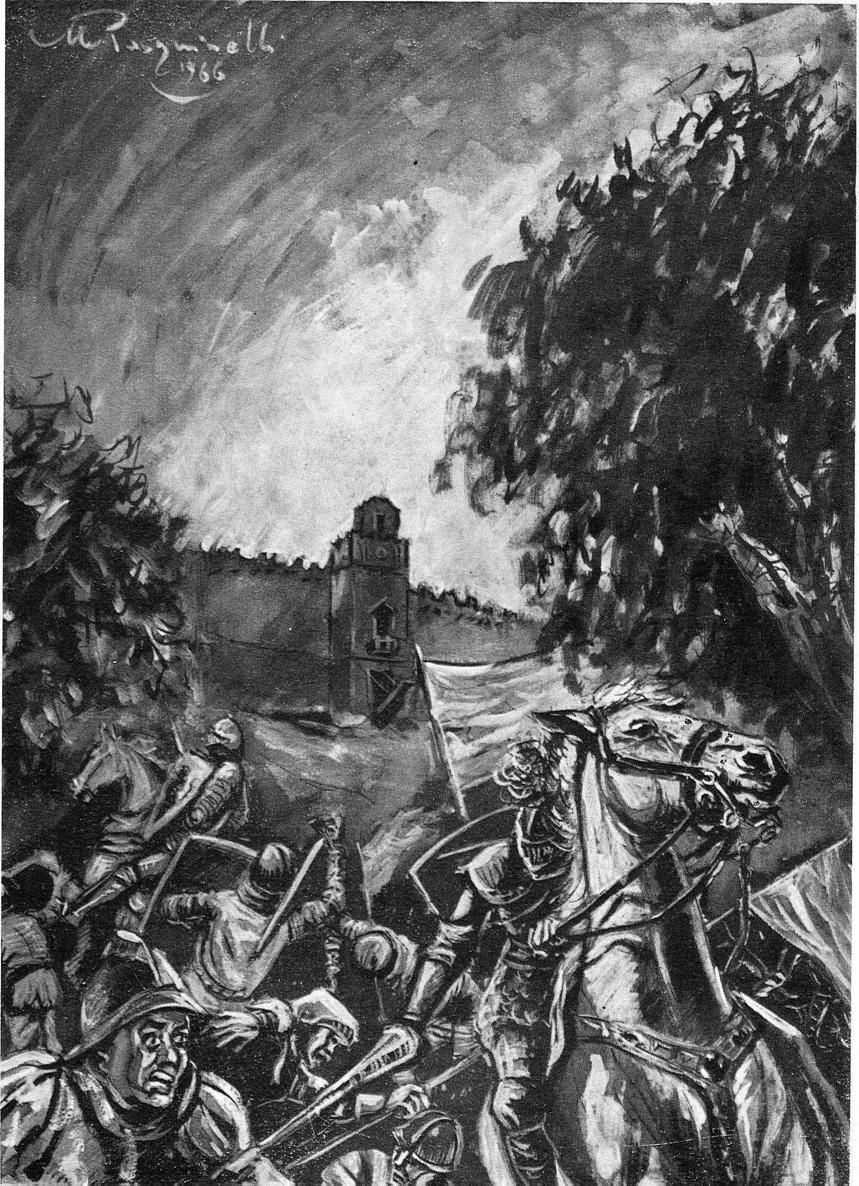
Despite the preventive work of the citizens, the terrible disease, according to some, in particular according to the historian Anthony Gianandrea, arrived in Jesi by way of Ancona, in certain bales of ropes. It was also said that this plague came by God’s just judgment, because the year before some young people, finding a dead body of a stranger in Caldora’s house, all in one piece, as a joke, brought it in the days of Carnival in disguise for the city and, not having been punished for it, but rather by all the people helped, in a dream appeared to them the image of a black man who warned them that shortly afterwards they would die of the plague. It is a fact that the plague threw the population into the blackest misery.
Already the year before a multitude of locusts had almost eaten all the fodder, bringing a great hunger and many other miseries, which was the universal opinion that, if the Magistrate had not helped many with public money and ordered that those who killed a certain amount of locusts be rewarded, the following year a good part of the population would have starved to death. Such was the misery that the poorest people, not having enough to feed themselves, were forced to eat grasses, such as beasts, and some quantity of semolina.
In the meantime the two young people, almost breathless, had reached the top of the climb, they had walked a short stretch of Via Roccabella and had come to Piazza Colocci, illuminated by the sun on a beautiful July day, stopping to admire the facade of the Government Palace, better known as Palazzo della Signoria.
«I don’t understand why people insist on calling it Palazzo della Signoria, when in Jesi a real Signoria has never existed», Lucia began by addressing her erudite companion, hoping for his usual competent intervention.
«And indeed Jesi was a Republic, as we can see in various writings on the icons on the walls of this palace. A republic, however, subject to the highest papal power, which extended its protective wings so far: “Res Publica Aesina, Libertas ecclesiastica - Alexander VI pontifex maximus”. This was to remind everyone that Pope Alexander VI himself, in the year 1500, inaugurated and blessed this palace, the work of the architect Francesco di Giorgio Martini, granting the city of Jesi to continue to be an independent republic and to continue to be able to adorn the symbol of the city, the rampant lion, with the royal crown, provided that it was in any case respectful of the power of the Church, and at the same time accepted the important presence of a papal legate.»
«Interesting. So it is clear that the name Palazzo della Signoria is linked to the architect who built it, and who is among those who designed the Palazzo Vecchio in Florence.» At that moment, Lucia set her gaze on the marble icon, depicting the rampant lion in relief, surmounted by a bronze crown post. Underneath the icon, an inscription in a Latin that was not very comprehensible. «It seems that this crown, above the lion, has very little to do with the rest of the work. Why didn’t the sculptor who made the work also sculpt the crown above the lion’s head? And this inscription? A very rough Latin, I’d say. The dates aren’t written correctly either!»
MCCCCLXXXXVIII
AESIS REX DEDIT FED IMP
CORONAVIT RES P. ALEX
VI PONT INSTAURAVIT
«Sure», replied Andrea. «I’'s a rather “macaronic” Latin, but what do we want to do with it, here we are between the end of the 1400s and the beginning of the 1500s. Maybe the Latin grammar had fallen into oblivion. But the meaning of the sentence is that in 1498, with the blessing of Pope Alexander VI - Rodrigo Borgia - in the facade of the Palazzo della Signoria of Jesi the crown was added to the rampant lion, in honour of the birth given by the city to Emperor Frederick II. But if you raise your eyes you also see that the Pope had another icon added, the one depicting the crossed keys, symbol of the Vatican, and the phrase “LIBERTAS ECCLESIASTICA – MCCCCCCC”, to reinforce the concept we were talking about just now.»
«Trying to translate it literally, the meaning of the sentence seems a bit different», continued Lucia. «Taking the lion as the implied subject of the sentence, one could translate: King Esius gave it, Frederick the emperor crowned it, as a symbol of the “Res publica”, Alexander VI Pontiff established it. That is, King Esio, the mythical founder of the city of Jesi, indicated the lion as its symbol; later, Emperor Frederick II, who was born here in Jesi, had it crowned proclaiming the city “royal”, i.e. faithful to the Empire; finally, Pope Alexander VI had the symbol installed on the facade of the palace, to seal the fact that Jesi remained an independent republic, although subject to ecclesiastical authority.»
Doubtful, Andrea remained silent for a few moments, then resumed, not without a hint of scepticism.
«I would have to consult some texts to answer you properly. In any case, you are certainly right about one thing: the bronze crown was added in a postponed manner at a time after the execution of the sculpture itself.»
CHAPTER 6
Everything took light from her: she was the smile that illuminated everything around her
(Leo Tolstoy: Anna Karenina)
The afternoon lights cast sinister shadows on the faces of the angry crowd. Lucia was quick to run up the Pastori’s coast, walk diagonally along the dark road that ran under the walls of the Rocca and emerge in the Government’s Square, even before the first of the troublemakers arrived in that place going up the Longobardi’s Coast. He climbed the three steps that led to the churchyard of St. Augustine Church, thus remaining in a higher position than the square. In front of it, on the opposite side of the square, stood the Government Palace, recently completed and finished also inside thanks to the work of illustrious architects, such as Giovanni di Gabriele da Como, Andrea Contucci, known as Sansovino, and other distinguished sculptors and woodcarvers. Only the wooden blacksmith had yet to complete his work: he had been assigned the delicate task of carving and working on the ceilings of the Sala Grande, the Chancellery, the Camera del Podestà and other rooms.
When the first people armed with rudimentary tools, such as pitchforks, axes, shovels, but also knives and spears, founded who knows where, began to arrive noisily in the Government’s Square, Lucia tried to stand up in all its height, to be noticed by all, dominating the crowd. She was excited, her heart was in her throat, she didn’t know if the words that would come out of her mouth could be the right ones. But she had to try everything. Someone began to recognize her, pointing her out to others, to those who were invading the square.
«It’s the noble Lucia Baldeschi! The betrothed of the late Captain of the People!»
«Yes, if we’d had had Andrea dei Franciolini at the head of the town and the countryside, we certainly wouldn’t be like this!»
Lucia was afraid that someone might say at that point that she agreed with her evil uncle to kill Andrea, and that if the latter hadn’t been executed, it had been by pure chance, and certainly not by her intercession. She didn’t even realize that everything around her was forming like a luminous aura, so intense that people were almost afraid of it. As the sun went down, the Square was illuminated by the light that she herself emanated from there, from the churchyard. When she raised her arms and everyone was silent, Lucia could not escape the whispered phrases of those closest to her.
«She is a Saint. She is the Virgin Mary made person!», they said, kneeling down and dropping their weapons to the ground. All this instilled more courage in her, who knew she had powers beyond the norm, which at times were beyond her control, as in this case. But she could not waste time chasing after her thoughts, the fact that if her grandmother had had time to finish instructing her, she would now be able to control these abilities to perfection. She had to talk to the person in front of her. So she let her words be inspired by her grandmother’s spirit, which perhaps still hovered indomitably around her.
«Gentlemen, rising up against the authorities makes no sense at all. There inside that Palace, the nobles and elders of Jesi, what we call the Council of the Best, are just waiting for a strong leadership. And now is the time. Yes, because Pope Adriano VI has decided to recall the papal legate, believing that Cardinal Cesarini is more useful in Rome than here in Jesi, where he is hardly ever present. And that is good for us!»
The news, still unknown to most of those present, even because it was only partly true, had its effect and the buzz began to rise in the crowd, forcing Lucia to raise her voice, almost to the point of feeling pain in her throat.
«As I was saying, this is good for us. We have every right to expel the Cardinal’s exiled vicars. And we will do so without bloodshed. I already know I have the support of the Pope, to whom I have sent missives on the matter, through messengers who are already on their way to Rome. Father Ignazio Amici, the Dominican Inquisitor, is already packing his bags, but rest assured that he won’t be the only one to leave the city in the coming days. And we’ll have a Bishop from Jesi again, Cardinal Ghislieri. Go on, then, lay down your weapons, go home and sleep soundly. Also because - and this is a solemn promise on my part - tomorrow morning I will go through that door, yes, the door of the Government’s Palace. I will present myself to the Council of the Best and claim the office that is rightfully mine, for having been promised in marriage to Andrea Franciolini: I will be YOUR CAPTAIN OF THE PEOPLE!»
The enthusiasm exploded among the bystanders, those who were on their knees rose up, everyone abandoned tools and weapons in their hands, someone headed towards the young noblewoman to lift her and carry her in triumph along Via delle Botteghe to Piazza del Mercato. Lucia, lifted up by the arms of some energetic men, smiled, and her smile illuminated everything and everyone. At a certain point even the bells of the various churches began to ring festively. When the procession arrived in front of Palazzo Baldeschi, Lucia asked to be put to the ground, because she was very tired and wanted to return to her home to rest.
«Go now, and come back tomorrow to celebrate the new Captain of the People and the new Bishop of Jesi.»
As the crowd dispersed and Lucia was about to cross the threshold of her family palace, many did not escape the movements there, at the entrance of Palazzo Ripanti. Cardinal Cesarini’s vicar was hurriedly loading his luggage onto a horse-drawn cart.
The bastard has understood and is already leaving!, she said to herself. It’s better that way. I’m not so sure I can control everyone who claims his head.
The emotions of that day had been so great that Lucia sank into a deep sleep, without having even had dinner. She would have liked to take a hot bath before going to bed, but at the palace she no longer had a maid to take care of her. Moreover, since she had preferred to adopt the country residence for the girls, she had moved most of the servants there, and in the austere Baldeschi palace there remained very few servants, mostly male, who took care of the kitchens and stables.
She was awakened by an insistent knock on the door of her room, when the sun had not yet risen. She struggled to get out of bed, got herself settled as best she could, and opened the door by a crack, to see who was disturbing her at that unusual hour. A young boy, still beardless, but dressed in full dress, stockings, and with a long feathered hat on his head, did a reverence and tried to apologize for the time, almost stammering.
«Excuse me so much, Madame, but what I must tell you is of the utmost urgency. The executioner sent me from Piazza della Morte.»
Lucia’s throat went up and her mind, as sleepy as it was, suddenly became clear again, remembering that this was the time decided for Mira’s execution. What was going on? Why had the executioner sent this young man to trouble her?
«Wait a few moments, boy. I’ll make myself presentable, and I’ll be right with you. Take a seat in one of the chairs along the corridor. I’ll be as quick as I can.»
She styled her hair, put on a sober dress to give her freedom of movement, and soon reached the young man in the corridor.
«Well? What’s going on?»
«The executioner wants you in Piazza della Morte.»
«Why on earth?» replied Lucia outraged. «I made it clear that I would never want to see my handmaiden executed! So why disturb me?»
«There is a problem. The last wish of a condemned person is sacred and must be granted. The executioner cannot proceed until the victim has been satisfied. It is an unwritten law, but for Gerard, our executioner, it is a matter of honor.»
«And what have I to do with it, pray? What is Mira’s last wish?»
«That is the point. Your handmaiden has asked that you be near her on the point of death. You must come.»
«That’s out of the question. I swore to myself that I would never witness a capital execution again.»
«In this case I’ll have to go and wake up Judge Uberti, who won’t be very happy...»
Having understood the antiphon, and knowing that in those days it was better not to make trouble with the authorities of the old guard, Lucia decided to follow the young man in Death’s Square. At the end of the day, a few hours later she would show up at the Government’s palace and would forever give greetings to the old “caryatids”, which would no longer continue to hold public office. So it was better not to start antagonizing Judge and others ahead of time.
Walking along Via delle Botteghe in the dampness of the early dawn, Lucia squeezed herself into her dress, shivering with cold, even though it was already the height of the summer season. She crossed Porta della Rocca, continuing to follow the boy who was leading the way, but when she caught a glimpse of her young handmaiden, her heart leapt, she felt it pulsating in her throat and could not hold back the tears that were trying to gush from her eyes. Mira’s head was already resting on the stump. The executioner was there beside her, with the hood on his head and the sharp axe resting on the ground. He hadn’t even bothered to pick up the condemned woman’s hair in a ponytail or a bun, because the previous day Father Ignazio Amici’s torturers had thought of having it cut almost to nothing. The noblewoman felt the pleading gaze of her handmaiden upon her and could not help but approach her, caressing the back of her neck and bringing her lips closer to the girl’s cheek.
The servant lowered her gaze and turned to her old mistress with a thread of voice.
«Now I can die happy. I have you next door. I know you have spared me a more atrocious torment and I wanted to thank you personally before I die. Pray for me, and commend my soul to the Lord.»
Lucia took Mira’s hand, came closer and whispered words into her ear, so that neither the executioner nor the boy who had accompanied her could hear.
«I would also like to spare you this torment. I have some gold coins with me. I could pay for the silence of these two. I’ll send the boy to the carpenter to ask him to make a chest, saying this was your last wish: to be buried inside a sarcophagus. The executioner won’t kill you, but he’ll tell everyone he did it. I will have him fill the chest with stones, so that it weighs as if it contained your body, and I will have it placed in the basement of the Church of Death. No one’s going to look inside. You will run down the hill and reach the convent of the Poor Clares of the Valley. Dressed as a nun, no one will recognize you. Let some time pass and then get away from Jesi. You can make a new life somewhere else...»
«No, my lady. Death no longer frightens me. My life ends here, today, on this square, on this stump. See that my body is given a proper burial.»
Mira looked at Gerardo, nodding her head. The executioner understood at once. The condemned woman’s wish had been granted. We could proceed. Lucia stepped back, let go of Mira’s hand, as the axe rose. She looked at the executioner’s eyes through the holes drilled in the hood and saw them shiny. But she did not have time to verify the truthfulness of her sensation, because with a sharp blow the instrument fell on the victim’s neck. The head rolled on the pavement, while the rest of the body was shaken by convulsions for a few brief moments, until it stiffened and fell sideways. Blood splashes from the neck grazed Lucia, but not a drop went to soil her clothes.
After a moment of absolute silence, a cock crowed in the distance. It was getting daylight, when the Piazza della Morte was crossed by a prolonged cry, a cry coming from the bowels of Lucia Baldeschi.
«Noooooooooooo...!»
CHAPTER 7
The mounts were fast and didn’t fear the climbs, descents and paths in the bush. So, to avoid the centre of Ancona, Andrea and Gesualdo had crossed the narrow valley between the hills, climbed up the Taglio di Candia and, leaving the Rocca di Montesicuro on their left, descended towards Paterno. From there, they had soon reached the castle of the Torrette, possession of the peaceful Counts Bonarelli. The doors of the castle, as usual, were open, and therefore Gesualdo beckoned his young friend to cross the inner courtyard without stopping to give many explanations.


